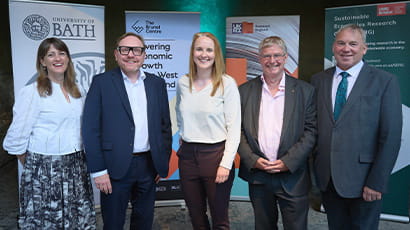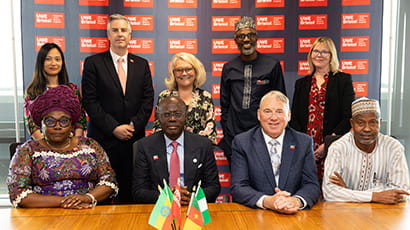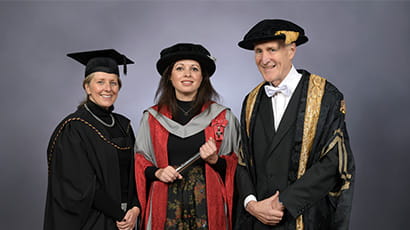Has a Bristol mayor made a difference?

Mayoral governance in Bristol has boosted the visibility of city leadership and helped promote Bristol on the national and international stage, a new study has found.
The research by UWE Bristol and the University of Bristol also showed the mayoral model of leadership had unnecessarily restricted the role of councillors and reduced citizens' belief in their ability to influence decisions.
Bristol was one of the pioneering UK cities to introduce an elected mayor in 2012. Researchers at both universities have gathered data over an eight-year period to explore whether the model has been successful.
Researchers compared people's views about the quality of city governance in Bristol as expressed in 2012, before Bristol had a directly elected mayor, with current views about the strengths and weaknesses of the mayoral model.
Academics have highlighted five major findings from their ongoing research, The Bristol Civic Leadership Project, in an independent report Mayoral governance in Bristol: Has it made a difference?
- The research shows that the introduction of mayoral governance in Bristol has given a significant boost to the visibility of city leadership. In 2012 24% of citizens thought that the city had visible city leadership. By 2018 this figure had more than doubled to reach 51%. The mayor of Bristol is a high-profile public figure able to convene important stakeholders; this is a marked contrast to the situation that existed in the pre-mayoral era.
- Mayoral leadership has led to a more broadly recognised vision for the city. In 2012, 25% of citizens thought that the leadership of the council had a vision for the city. This rose to 39% in 2018. In interviews carried out in 2019 civic leaders indicated that mayoral leadership has been critical in developing the new One City Plan, which sets out a detailed vision for Bristol in 2050.
- The mayoral model has enabled the first two mayors of Bristol to promote Bristol on the national and international stage, and this outgoing leadership has attracted investment to the city.
- The research found that the role of councillors in exercising civic leadership has been unnecessarily restricted within the way the mayoral model has operated so far. This drawback was identified in the researchers' 2015 report and remains a concern that needs to be addressed.
- There has been a small decline in the number of citizens believing that there are many opportunities to get involved in decision-making in the city. The proportion feeling this way dropped from 27% in 2012 to 23% in 2018.
Robin Hambleton, Emeritus Professor of City Leadership at UWE Bristol and one of the report's authors, said: “There is a chance to study this report on whether the mayoral model has worked. We hope it will help the citizens of Bristol reach an informed view about whether Bristol should continue with a mayoral model of governance or get rid of it. We also identify challenges that need to be addressed by central government ministers if they want mayoral governance to succeed in localities across the UK.”
Dr David Sweeting, a Senior Lecturer in Urban Studies at the University of Bristol and another of the report's authors, said: “The report offers several suggestions on how to improve mayoral governance in England in general, and in Bristol in particular. For example, it suggests that Whitehall needs to devolve far more powers and fiscal autonomy to local areas so that elected local leaders, whether they are directly elected mayors or not, can exercise decisive place-based leadership.”
Related news

25 November 2025
Health-tech start up MyCelsius launches breakthrough cooling tech for hot flushes developed at UWE Bristol’s Launch Space
A pioneering Bristol-based health-tech company developing cutting-edge cooling technology for hot flushes has credited UWE Bristol’s Launch Space incubator with playing a key role in accelerating its product development.

22 August 2025
A decade of Future Space: How UWE Bristol’s enterprise zone is powering innovation and economic growth
Tracey John, Director of Research and External Engagement, reflects on the impact of Future Space and its role as a launchpad for cutting-edge companies shaping the future of how we live and work.

20 August 2025
Nigerian higher education leaders explore new routes to university-industry collaboration at UWE Bristol-led event supported through HEIF
An event brought together through UWE Bristol’s Centre for African Social and Economic Transformation (CASET) discussed innovative approaches to improving graduate employability in Nigeria.

11 July 2025
Wound dressings developed with support from UWE Bristol to be launched by global firm
Technology that a team of UWE Bristol scientists helped develop to aid the healing of chronic wounds will be used in new ‘smart dressings’ being launched by global medical company.

10 July 2025
Researcher awarded funding to develop digital health platform that connects people to local services
A UWE Bristol academic has received funding to develop an online platform that connects people to local community organisations offering health and social care support.

03 July 2025
Research lab The Brunel Centre opens to power sustainable and inclusive growth for the West of England
A new data and research centre designed to support sustainable and inclusive growth and industrial strategy in the region, has officially launched.

11 June 2025
Telling our story at UWE Bristol: RISE with us
UWE Bristol has launched RISE - standing for Research, Innovation, Skills and Enterprise - an institutional framework which shapes the University's purpose, culture and future growth.

23 May 2025
New Centre launched at UWE Bristol to drive social and economic change across Africa through HE partnerships
UWE Bristol has launched the Centre for African Social and Economic Transformation (CASET) — a collaborative platform to support African-led innovation, research and HE initiatives.

11 December 2024
UWE Bristol alum develops flatpack wood stove to heat homes damaged in conflict
A UWE Bristol alum has designed a flatpack wood burning stove which will provide a vital heat source for people whose homes have been damaged in areas of conflict across the world.

28 November 2024
Entrepreneur and advocate for workplace equality awarded honorary degree by UWE Bristol
Dr Zara Nanu MBE, an innovator in addressing workplace inequalities and tackling the gender pay gap, has been awarded an honorary degree by UWE Bristol.

21 November 2024
Crypto-trader training platform among eight graduate businesses to receive funding boost
A platform that trains people to trade cryptocurrency safely is one of eight graduate businesses to have received funding through UWE Bristol’s Entrepreneurial Futures Award.

20 November 2024
Innovative university-business partnership to power economic growth and devolution for the West of England
A new centre created by the University of Bath with UWE Bristol and Futures West will pioneer new approaches to economic research and data analysis for the West of England.






